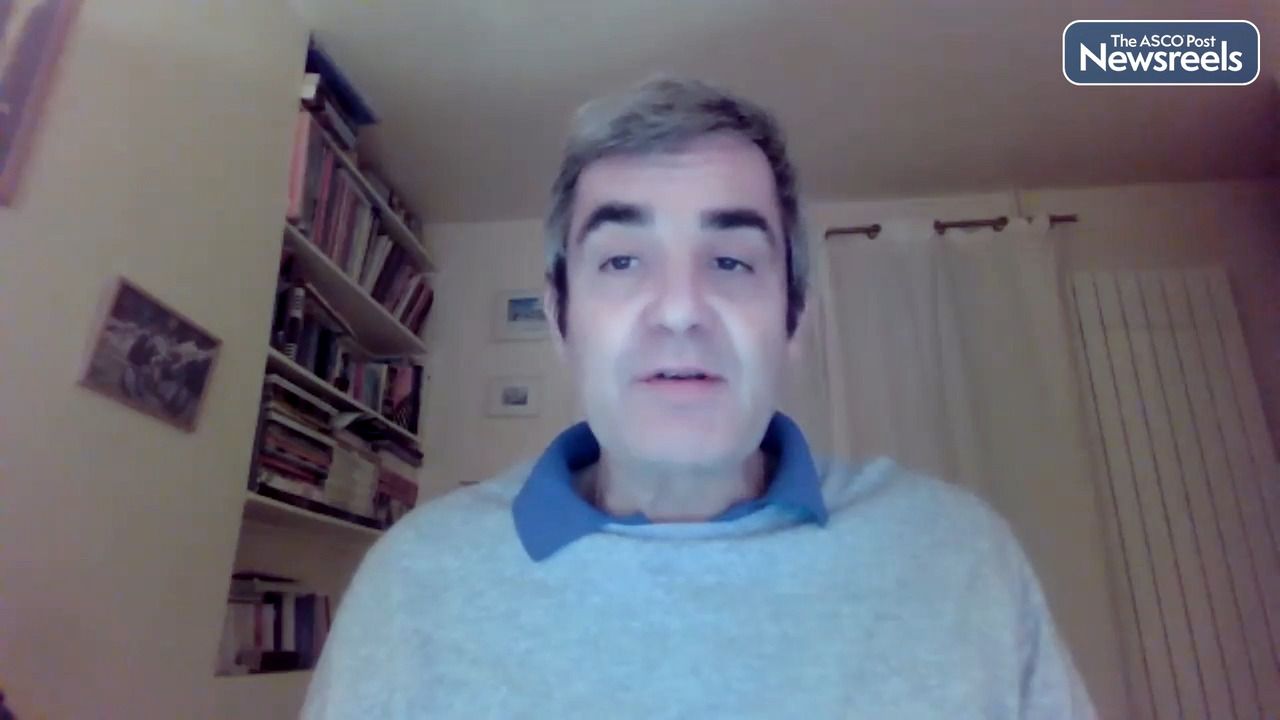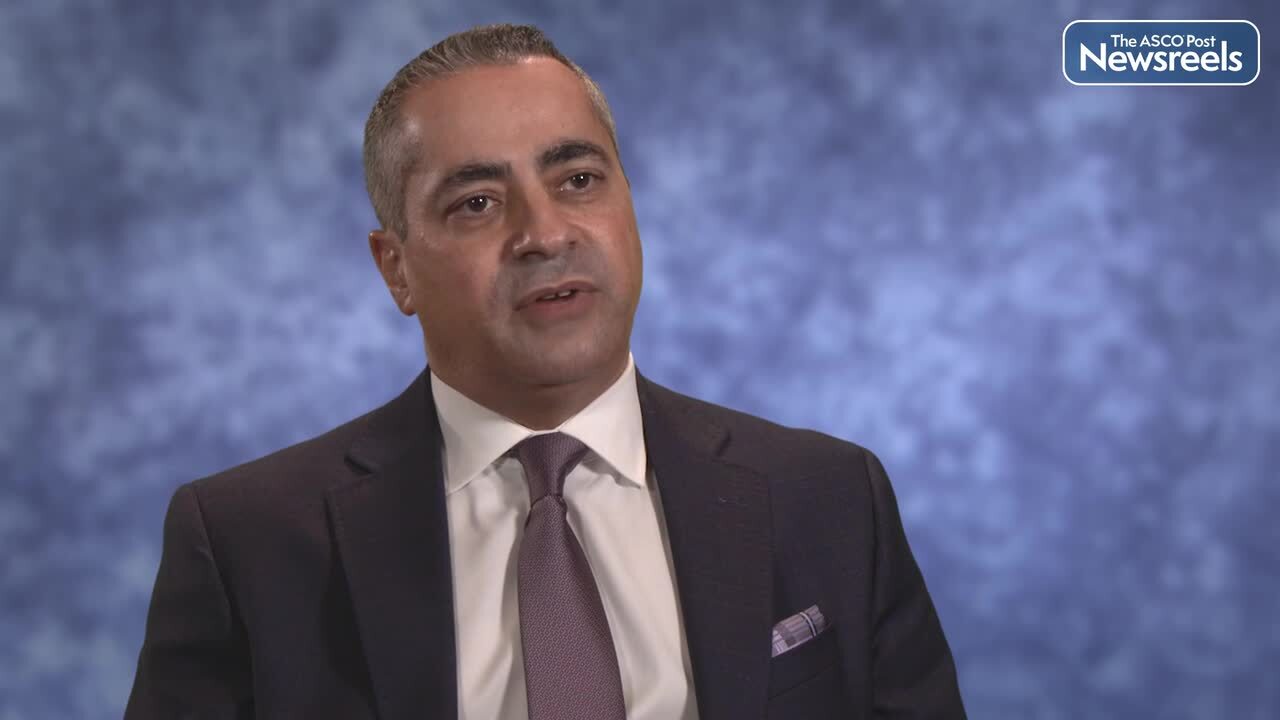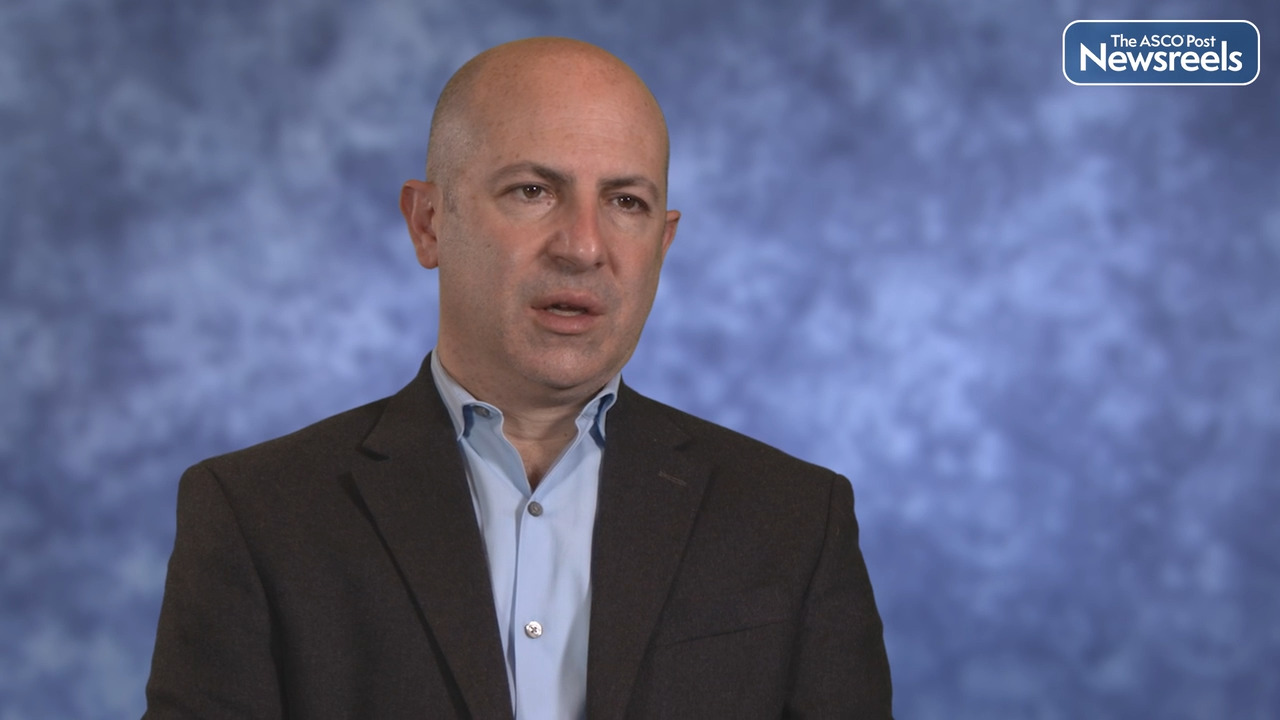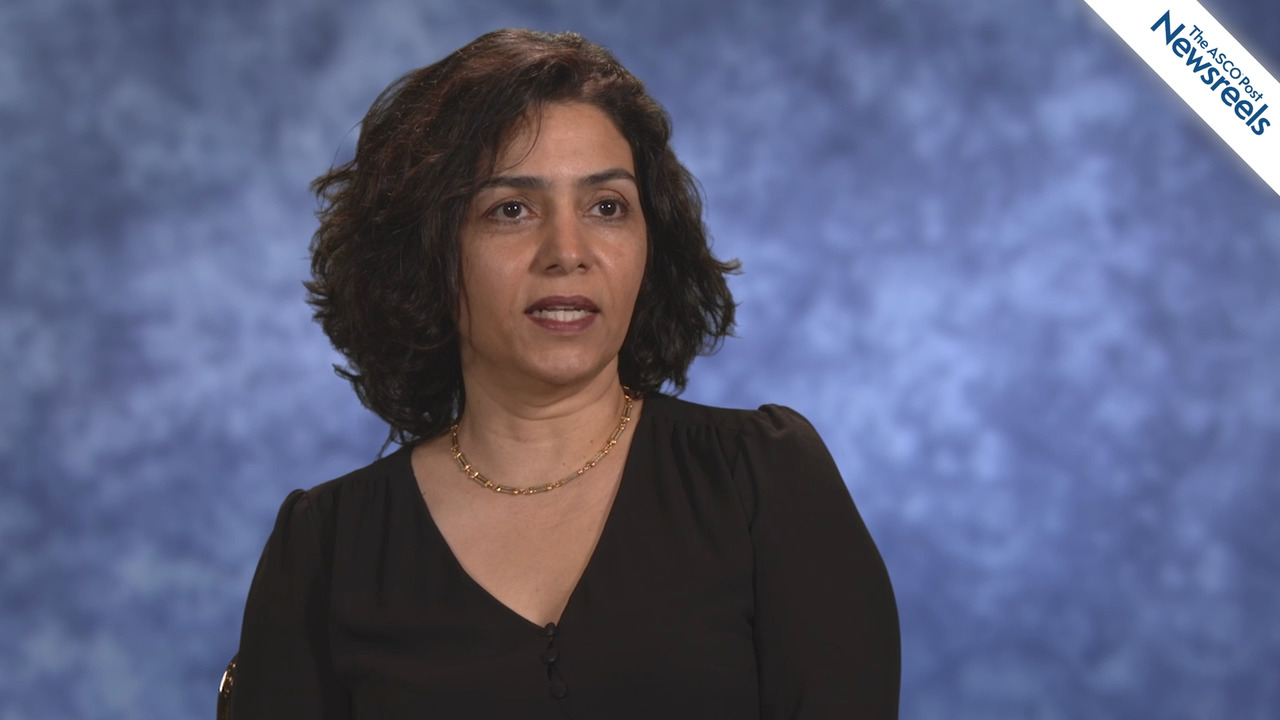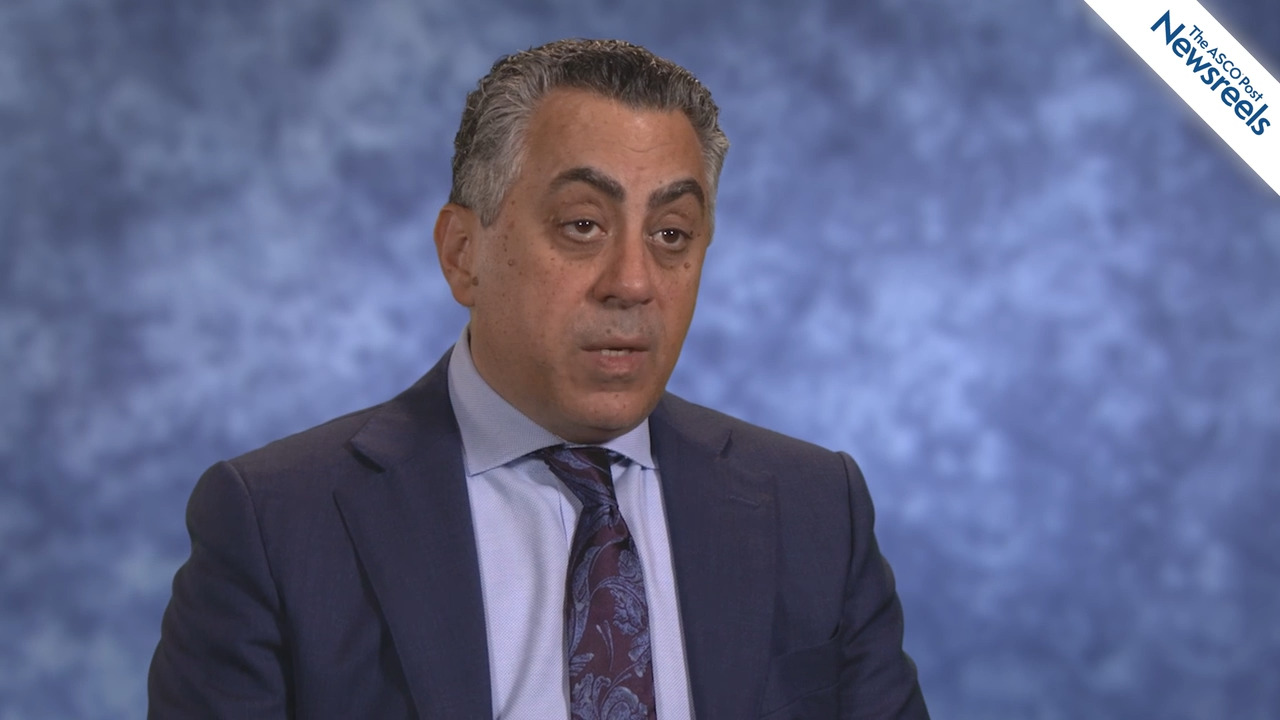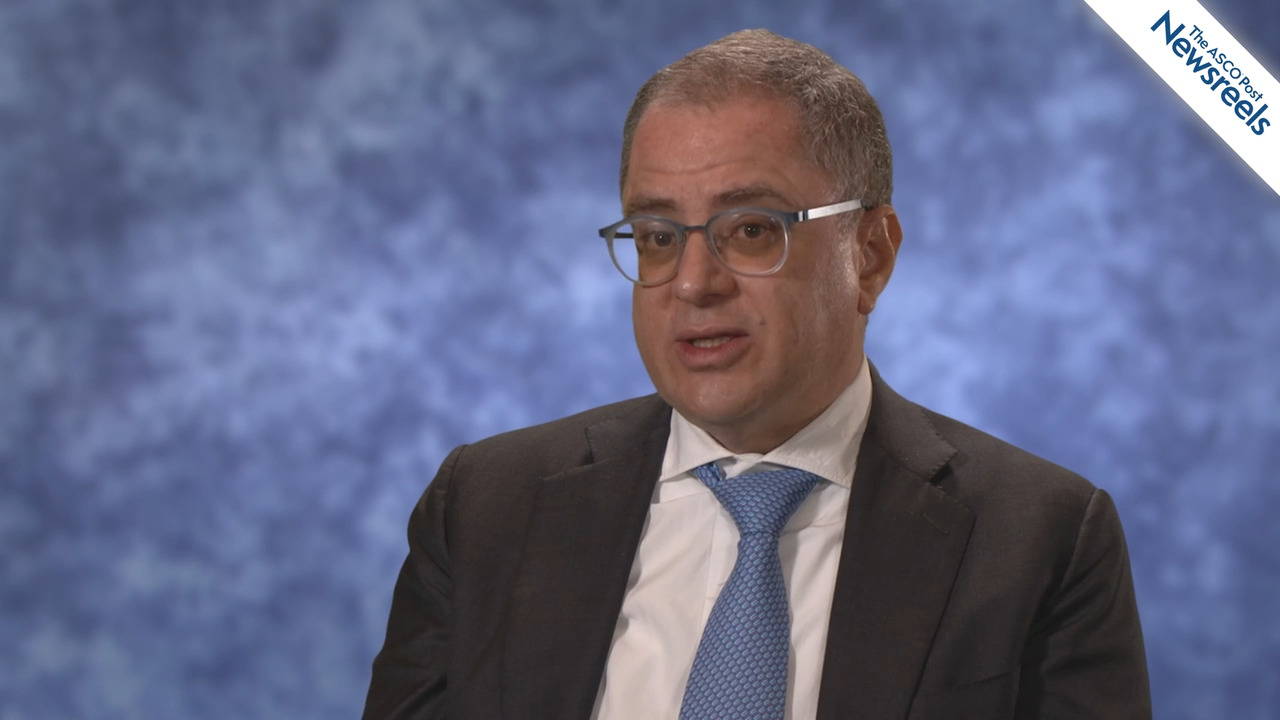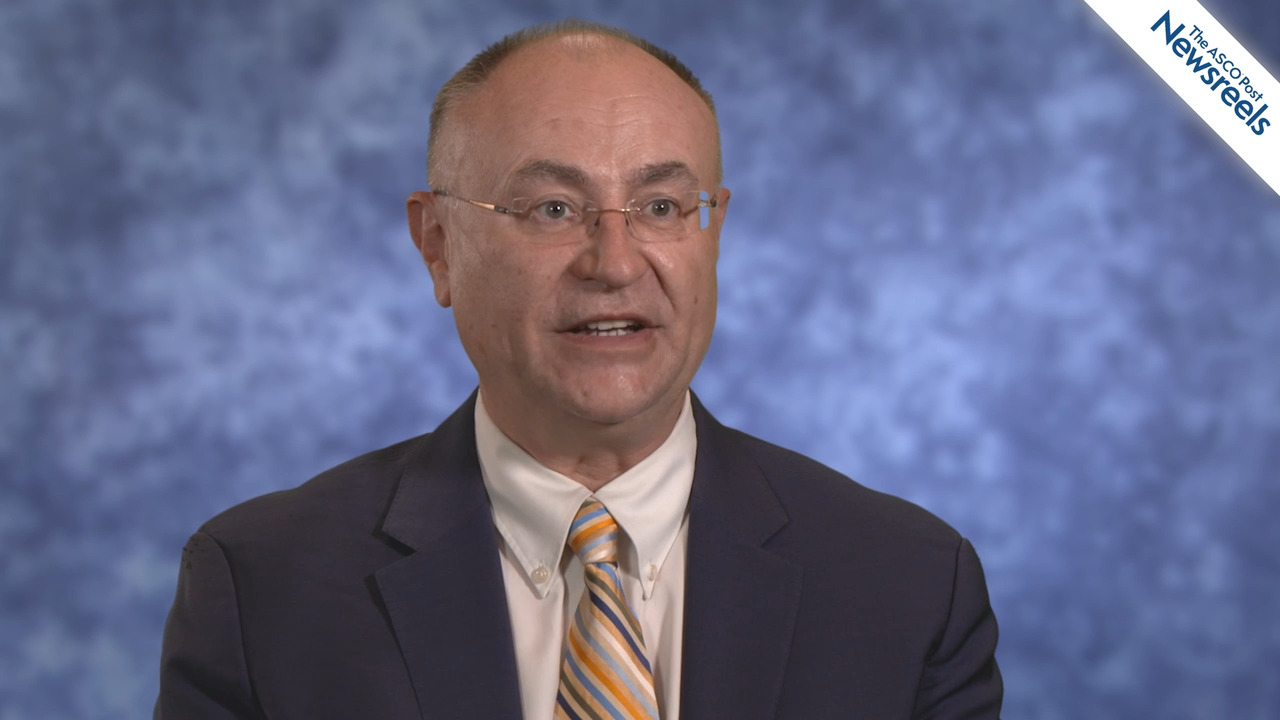2022 ASCO Gastrointestinal Cancers Symposium
Clinical Trials Updates in the Treatment of Older Adults With Gastrointestinal Malignancies
The theme of the 2022 ASCO Gastrointestinal Cancers Symposium was “Accelerating Access to Precision Care Through Innovation.” Several studies presented at this meeting focused on older patients, who r...
Adjuvant Therapy for Colon Cancer: Impact of Stopping Treatment Early
For patients with stage III colon cancer, early discontinuation of adjuvant chemotherapy leads to worse outcomes—but early discontinuation of oxaliplatin did not. These findings, which came from an an...
High Response Rate Seen With Nivolumab Added to Encorafenib and Cetuximab in BRAF V600E–Mutated Metastatic Colorectal Cancer
The combination of encorafenib, cetuximab, and nivolumab produced responses in 50% of patients and disease control in 96% of patients with microsatellite-stable BRAF V600E–mutated metastatic colorecta...
NIPICOL Trial: Promising Outcomes With Shorter Duration of Checkpoint Inhibition in Metastatic Colorectal Cancer
The phase II GERCOR NIPICOL study evaluated 1 year of treatment with nivolumab plus ipilimumab in patients with chemotherapy-resistant metastatic colorectal cancer whose tumors were microsatellite ins...
Gabriel A. Brooks, MPH, MD, Comments on the ACCENT/IDEA Database Analysis Results
Gabriel A. Brooks, MPH, MD, Associate Professor of Medicine, Norris Cotton Cancer Center at Dartmouth-Hitchcock Medical Center, was invited to discuss the results of the ACCENT/IDEA database analysis ...
Adjuvant Therapy for Colon Cancer: Impact of Stopping Treatment Early
For patients with stage III colon cancer, early discontinuation of adjuvant chemotherapy leads to worse outcomes—but early discontinuation of oxaliplatin did not. These findings, which came from an an...
Expert Point of View: Stefano Cascinu, MD
Stefano Cascinu, MD, of the Comprehensive Cancer Center, Università Vita-Salute, IRCCS-Ospedale San Raffaele, Milan, Italy, was the invited discussant of KEYNOTE-5901 and CheckMate 649.2 “These landma...
Checkpoint Inhibitors in Esophagogastric Cancer: Updates of Landmark Trials
Updates of landmark trials of immune checkpoint inhibitors as first-line therapy for advanced HER2-negative esophagogastric cancers were presented at the 2022 ASCO Gastrointestinal Cancers Symposium. ...
Expert Point of View: Christopher Willett, MD
Christopher Willett, MD, Professor and Chair of the Department of Radiation Oncology at Duke University in Durham, North Carolina, shared his thoughts on the findings of the study by Lumish et al1 wit...
Small Study Reports Neoadjuvant PD-1 Blockade Yields 100% Clinical Complete Response Rate in Locally Advanced Mismatch Repair–Deficient Rectal Cancer
In a small study of patients with locally advanced mismatch repair–deficient (dMMR) rectal cancer, treatment with the anti–PD-1 agent dostarlimab-gxly alone led to a clinical complete response rate of...
Expert Point of View: Samuel J. Klempner, MD
Samuel J. Klempner, MD, Associate Professor at Massachusetts General Hospital and Harvard Medical School, commented on the NEONIPIGA study for The ASCO Post. “This study was the first prospective data...
Neoadjuvant Checkpoint Inhibitor Doublet Yields Complete Responses in Gastroesophageal Cancers
In patients with resectable microsatellite instability–high (MSI-H)/mismatch repair–deficient (dMMR) gastric and gastroesophageal junction adenocarcinoma, dual checkpoint inhibition with ipilimumab an...
Expert Point of View: Benoit Rousseau, MD, PhD
Benoit Rousseau, MD, PhD, of Memorial Sloan Kettering Cancer Center, New York, called the findings of the phase II GERCOR NIPICOL trial “interesting and convincing.” Long-term follow-up showed the 3-y...
NIPICOL Trial: Promising Outcomes With Shorter Duration of Checkpoint Inhibition in Metastatic Colorectal Cancer
The phase II GERCOR NIPICOL study evaluated 1 year of treatment with nivolumab plus ipilimumab in patients with chemotherapy-resistant metastatic colorectal cancer whose tumors were microsatellite ins...
Updated Findings on T-DXd in Gastrointestinal Malignancies
Updates of phase II studies evaluating fam-trastuzumab deruxtecan-nxki (T-DXd) in gastrointestinal cancers were presented at the 2022 ASCO Gastrointestinal Cancers Symposium, continuing to offer suppo...
GALAXY Trial: Circulating Tumor DNA Appears Prognostic in Resected Colorectal Cancer
The use of circulating tumor DNA (ctDNA) assays in early-stage colorectal cancer is highly prognostic for recurrence and may help identify patients who could benefit from adjuvant chemotherapy, accord...
Expert Point of View: Anthony El-Khoueiry, MD
Anthony El-Khoueiry, MD, Member of the Section of Gastrointestinal Cancers, Director of the phase I program, and Associate Professor of Clinical Medicine at the Keck School of Medicine of the Universi...
HIMALAYA Trial: First-Line Tremelimumab Plus Durvalumab Improves Overall Survival in Unresectable Hepatocellular Carcinoma
Patients with advanced, unresectable hepatocellular carcinoma may be gaining another first-line treatment option. In the global phase III HIMALAYA trial, a single priming dose of tremelimumab plus reg...
Expert Point of View: Nilofer Azad, MD
Nilofer Azad, MD, Professor of Oncology at Johns Hopkins University School of Medicine and Co-Director of Cancer Genetics and Epigenetics at the Sidney Kimmel Comprehensive Cancer Center, Baltimore, w...
TOPAZ-1: Overall Survival Prolonged With First-Line Immunotherapy Plus Chemotherapy in Biliary Tract Cancer
For the first time, a phase III study has shown an overall survival benefit for upfront treatment using immunotherapy plus chemotherapy in advanced biliary tract cancer. In the TOPAZ-1 trial, the addi...
High Response Rate Seen With Nivolumab Added to Encorafenib and Cetuximab in BRAF V600E–Mutated Metastatic Colorectal Cancer
The combination of the BRAF inhibitor encorafenib with cetuximab and nivolumab produced responses in 50% of patients and disease control in 96% of patients with microsatellite-stable BRAF V600E–mutate...
KRYSTAL-1: Adagrasib Controls Disease in Gastrointestinal Malignancies Beyond Colorectal Cancer
A disease control rate of 100% was achieved in gastrointestinal cancers treated with the KRAS G12C inhibitor adagrasib in the phase II KRYSTAL-1 trial, presented at the 2022 ASCO Gastrointestinal Canc...
Thierry André, MD, on Esophagogastric Adenocarcinoma: New Findings on Nivolumab and Ipilimumab
Thierry André, MD, of Sorbonne University and Saint-Antoine Hospital, discusses phase II results from the GERCOR NEONIPIGA study, which suggests neoadjuvant therapy with nivolumab and ipilimumab may b...
Romain Cohen, MD, PhD, on Metastatic Colorectal Cancer: Long-Term Follow-up on Nivolumab Plus Ipilimumab
Romain Cohen, MD, PhD, of Sorbonne University and Saint-Antoine Hospital, discusses phase II results of the GERCOR NIPICOL study, which suggests nivolumab plus ipilimumab at a fixed duration of 1 year...
Melissa Amy Lumish, MD, on Rectal Cancer: PD-1 Blockade for Mismatch Repair–Deficient Disease
Melissa Amy Lumish, MD, of Memorial Sloan Kettering Cancer Center, discusses new findings showing a 100% complete response rate to PD-1 blockade alone among the first 11 patients with locally advanced...
Van K. Morris, MD, on Metastatic Colorectal Cancer: Early Trial Results on Encorafenib, Cetuximab, and Nivolumab
Van K. Morris, MD, of The University of Texas MD Anderson Cancer Center, discusses phase I/II data suggesting that encorafenib plus cetuximab and nivolumab is safe and well tolerated for patients with...
Gabriel A. Brooks, MPH, MD, on Colorectal Cancer: Expert Perspective on the Need to Deintensify Oxaliplatin
Gabriel A. Brooks, MPH, MD, of the Norris Cotton Cancer Center, discusses key studies that, when synthesized, suggest the benefits of oxaliplatin may be less than often assumed. The toxicities are wel...
Anthony B. El-Khoueiry, MD, on Hepatocellular Carcinoma: Expert Perspective on Novel Additive Strategies
Anthony B. El-Khoueiry, MD, of the University of Southern California, Norris Comprehensive Cancer Center, discusses two key phase III studies of first-line treatment in hepatocellular carcinoma: the L...
Francesca Battaglin, MD, on Upper GI Cancers and the Potential Value of Recurrent Neoantigens
Francesca Battaglin, MD, of USC Norris Comprehensive Cancer Center and the Keck School of Medicine, discusses findings from one of the largest studies to investigate recurrent neoantigens in upper gas...
Zev A. Wainberg, MD, on Gastric or Gastroesophageal Junction Adenocarcinoma: Follow-up Data on Pembrolizumab and Chemotherapy
Zev A. Wainberg, MD, of the University of California, Los Angeles, discusses an update, of 25 additional months, on phase III safety and efficacy results from the KEYNOTE-062 trial. This study compare...
Afsaneh Barzi, MD, PhD, on Colorectal Cancer: Early Data on Regorafenib and Pembrolizumab
Afsaneh Barzi, MD, PhD, of City of Hope Comprehensive Cancer Center and AccessHope, discusses results from a phase I/II study of regorafenib and pembrolizumab in refractory microsatellite-stable color...
Tanios S. Bekaii-Saab, MD, on Pancreatic and Other Tumors With KRAS G12C Mutation: Updated Data on Use of Adagrasib
Tanios S. Bekaii-Saab, MD, of Mayo Clinic, discusses new findings from the KRYSTAL-1 study, which suggested adagrasib monotherapy is well tolerated and demonstrates clinical activity in pretreated pat...
Ghassan K. Abou-Alfa, MD, MBA, on Hepatocellular Carcinoma: Open-Label Trial of Tremelimumab and Durvalumab
Ghassan K. Abou-Alfa, MD, MBA, of Memorial Sloan Kettering Cancer Center and Weill Medical College at Cornell University, discusses phase III results of the HIMALAYA trial, which showed the combinatio...
Nilofer Saba Azad, MD, on Novel Treatment Combinations Under Study in Biliary Tract Cancers
Nilofer Saba Azad, MD, of Johns Hopkins Sidney Kimmel Cancer Center, assesses the findings from the phase III TOPAZ-1 trial, a study of durvalumab in combination with gemcitabine plus cisplatin in pat...
Heinz-Josef Lenz, MD, on Colorectal Cancer: Update From the CheckMate 9X8 Trial on Nivolumab, mFOLFOX6, and Bevacizumab
Heinz-Josef Lenz, MD, of USC Norris Comprehensive Cancer Center, discusses phase II results from the CheckMate 9X8 study, which compared nivolumab plus fluorouracil/leucovorin/oxaliplatin (mFOLFOX6) a...
Yu Sunakawa, MD, PhD, on Gastric Cancer: Predicting Treatment-Related Toxicities With Biomarkers
Yu Sunakawa, MD, PhD, of Japan’s St. Marianna University School of Medicine, discusses his findings from the DELIVER trial, which suggest the gut microbiome may predict skin toxicities in patients wit...
Kohei Shitara, MD, on Gastric and Esophageal Cancers: Long-Term Follow-up on Nivolumab Plus Chemotherapy
Kohei Shitara, MD, of Japan’s National Cancer Center Hospital East, discusses a long-term data follow-up from CheckMate 649, which support the continued use of nivolumab plus chemotherapy as first-lin...
Durvalumab/Tremelimumab Improves Overall Survival vs Sorafenib in Patients With Advanced Hepatocellular Carcinoma: HIMALAYA
Results from the randomized international phase III HIMALAYA trial showed that a combination of the anti–PD-L1 immunotherapy durvalumab plus the anti–CTLA-4 immunotherapy tremelimumab reduced the risk...
Durvalumab Plus Gemcitabine/Cisplatin Improves Survival in Patients With Advanced Biliary Tract Cancer: TOPAZ-1
Biliary tract cancer is a rare and often fatal disease comprised primarily of bile duct and gallbladder cancers; it is diagnosed in about 12,000 individuals each year in the United States. The cancer ...
